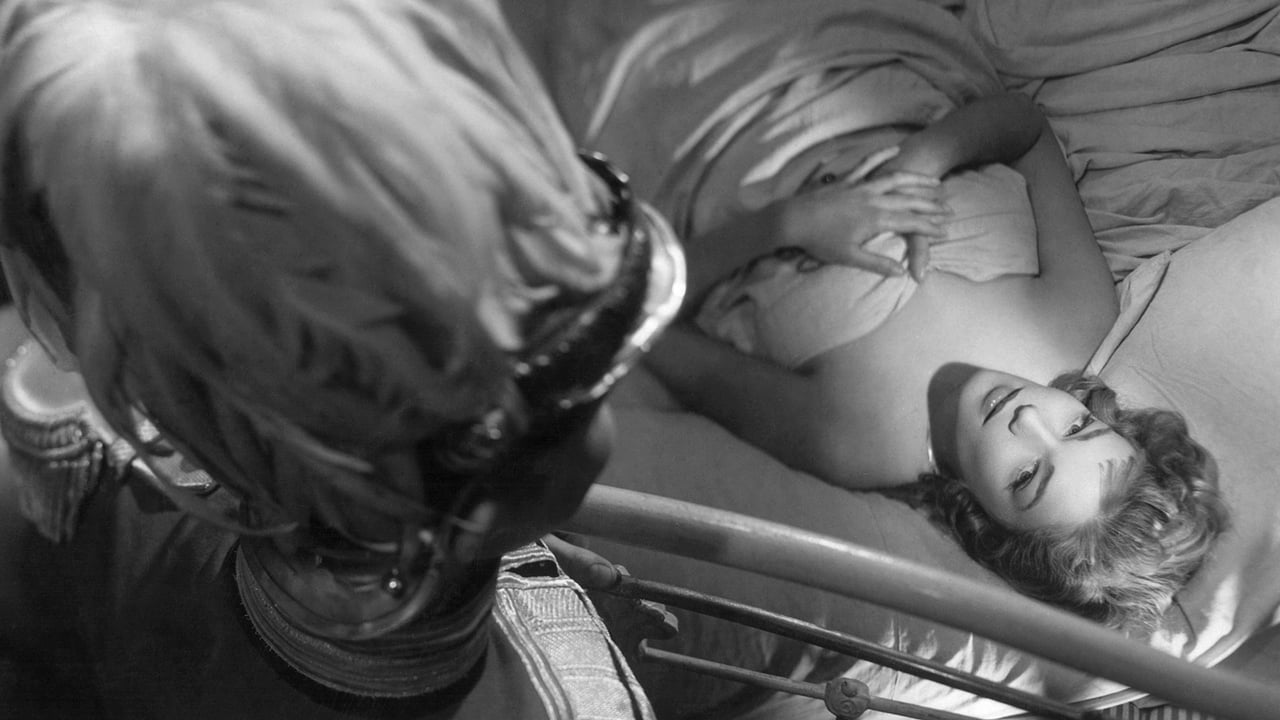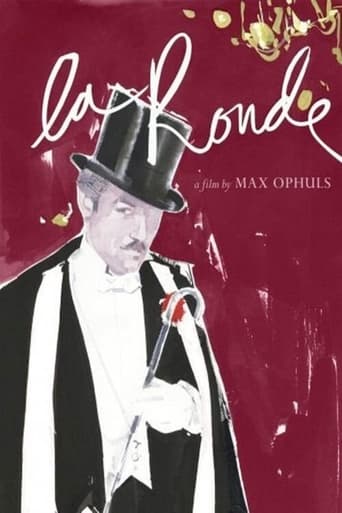Helloturia
I have absolutely never seen anything like this movie before. You have to see this movie.
Billie Morin
This movie feels like it was made purely to piss off people who want good shows
Yazmin
Close shines in drama with strong language, adult themes.
dokuz10
I like to avoid films that are too "theatrical" and/or "musical." This film is one of the few that showed me the there is a way to make the combination intriguing. I loved the self-conscious narrator. Despite the annoying singing (imo), he is a comic relief. He makes you take another look at the sequence before and after his appearance. Yes, there are symbolism and commentary in the film. But noticing these is not necessary to enjoy the wonderful cyclical visual storytelling. As the narrator says we are here for "the love of art of love" or the dirtiness of it depending on which way you look. Simple and masterful enough. I agree with the other commenters praising Ophüls' style.
avik-basu1889
The first word that came to my mind while watching Max Ophüls' 'La Ronde' is fascinating. The opening shot is a 5 minute long take which instantly establishes the tone and vibe of the film. The narrator played by the great Anton Wolbrook walks onto a stage(the screenplay written by Jacques Natanson and Ophüls is based on the play by Arthur Schnitzler), he then talks about who he is and what role he is supposed to carry out in the plot, he then interestingly steps down from the stage and we suddenly see the studio lights and then he walks into a set meant to simulate the look of 19th century Vienna with precise lighting to simulate sunrise and ambient noises of birds chirping in the distance. Through this opening sequence, Ophüls quickly establishes the distinction between the stage and cinema(which is relevant considering the source material for the film), he also establishes how film creates the veil of illusion that entraps and engrosses the viewer and from then on pretty much through to the end of the film, he plays around with this concept of cinematic illusion. 'La Ronde' was 'meta' before being meta was cool.The only other Max Ophüls film that I had seen before this was 'Letter from an Unknown Woman'. It really is interesting to analyse 'La Ronde' with regards to 'Letter from an Unknown Woman'. In 'Letter from an Unknown Woman', I very quickly understood that Ophüls was interested in the precise execution of the formal elements of filmmaking. The symmetry in the staging of specific scenes and sequences, precise placement of camera to call back to earlier scenes for ironic effect,etc., there are a number of examples of these technical elements in 'Letter from an Unknown Woman'. But along with that there was an intense and melancholic exploration of a woman's failed romance. Ophüls made us really care about Lisa in that film. In 'La Ronde', Ophüls continues to explore failed romance and the mysteries of sexual attraction. The film ventures into territories of exploring the causes and reasons behind an attraction between two people. Some may just be desperate to be with someone of the opposite sex, someone might seek company out of sheer boredom or for being in a bland and lifeless marriage, some might get attracted to specific individuals who might remind them of a loved one or a forgotten moment in the past,etc. But having said all of that, it becomes very clear that Ophüls is more interested in tweaking and maneuvering these themes to underline the plot machinations and forced interceptions that a director engages in during the process of making a film. The film doesn't dig deep into the characters and make us care for them, but intentionally so. For me, the character played by Anton Walbrook is supposed to be the surrogate for the director. The film is divided into a number of separate episodes. Walbrook makes his way into almost each episode to ensure that one character from that particular episode makes his/her way into the next episode to make sure the film keeps moving forward smoothly and the figurative merry-go-round keeps rotating. The camera movements are again as precise as they were in 'Letter from an Unknown Woman'.Due to restricted and limited access to the characters, we don't to really attach ourselves to any particular actor, but the acting is stellar from pretty much everyone involved, specially Anton Walbrook and Danielle Darrieux. I also have to mention that the song 'La Ronde de l'amour' and the tune adds to charm of the film exponentially. 'La Ronde' is a film about the magic that a filmmaker can create out of the illusion of cinema. Ophüls constantly uses self-reflexive scenes of Wolbrook breaking the 4th wall or Wolbrook walking in an area where the studio equipments are clearly visible or him changing the course of the characters to ensure the plot progresses in a specific way or even scenes of Wolbrook censoring and editing out chunks of the film. This is a very mature, artistic yet immensely mischievous exploration the process of filmmaking. Is it at the basic level, a gimmick film? Yes, but when a gimmick is executed in such a marvelous way by a master director, it becomes impossible not to admire it.
gsygsy
Vienna 1900. But actually a film studio in France. Ophuls never lets you forget that. This masterwork is deeply concerned with truth and illusion. In love and in art, in the art of love. It is charming whilst showing you the limitations of charm, seductive whilst demonstrating the hazards of seduction. Great as it is, it probably is not the peak of the director's achievement: LETTER FROM AN UNKNOWN WOMAN, MADAME DE... and LOLA MONTES probably have better claims to that accolade. But the rare weak moments do not, in my view, detract from LA RONDE's status as a masterpiece, since over all its quality is so high. It boasts a dazzling cast, led by wonderful Anton Walbrook, and a theme tune by Oskar Straus that will follow you around for the rest of your life.
Spondonman
La Ronde is one of my favourite French films, I can't watch it too often as it has its faults but it hasn't failed to enchant me each time so far. Max Ophuls certainly had an elegant style about him, see Le Plaisir and Madame de .. for further evidence. He re-created Vienna 1903 seemingly effortlessly in this, and even with Anton Walbrook continually talking to the camera and a film set deliberately momentarily on display it's pretty convincing. The attention to period detail was knockout, done as only Ophuls knew how. It can still be done nowadays but lacking one vital ingredient: an atmosphere, a feel for the time and place that came with nitrate film stock. Modern films can look as sumptuous in their set and costume design even in todays colour, but nearly all fail to generate an atmosphere because modern film stock plays too realistic - and it ain't going to get any better with digital no-film-at-all!The Austrian Anton Walbrook was a multi-linguist, his sinister sibilant English in Gaslight was perfect, in Colonel Blimp perfectly resigned as a defeated and baffled non-Nazi German soldier. He spoke a few gorgeous words in French in La Ronde and was then promptly dubbed for the rest of the movie. Maybe he couldn't sing, but why did they jettison such a lovely speaking voice as well?The conventional hypocrisy of sexually cheating on your (straight?!) partner in secret is repeatedly portrayed, as well as the notion that casual sexual gratification is usually desired by both sexes of both classes and as fast as possible. These lovers of sex move on: familiarity breeds contempt - once you've come it's time to go! This sex (not love) merry-go-round is one reason why there are 6 billion people on Earth today! But I definitely don't agree with the previous comment that Ophuls' version of La Ronde was about the spread of STD even though the original play had it as a major theme. Ophuls was all about Pleasure, not Pain - any syphilitic transmission was left to the imagination here. Walbrook waxes wistfully cynical throughout this beautiful film - he wouldn't change a thing about Life and Sex if he could. I'm happily forced to watch this film with amused sadness from his point of view, and wouldn't change a thing about it even if I could.

